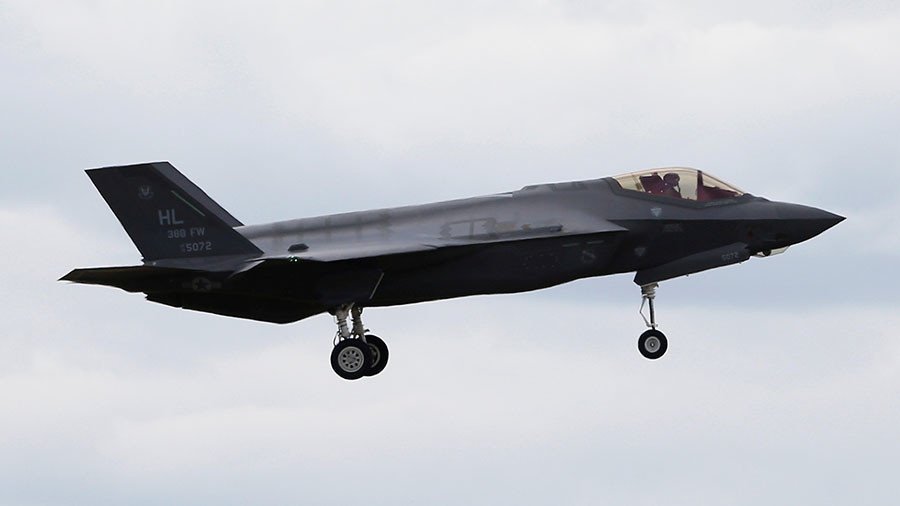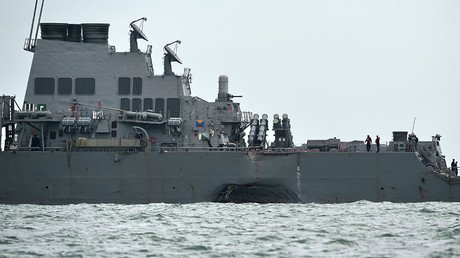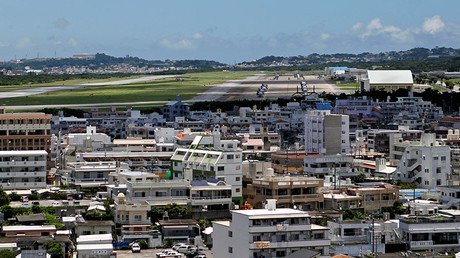F-35 fail: US fighter jet loses panel during 'routine training mission' in Okinawa

The US Air Force has encountered yet another issue with its aircraft in Okinawa, after an F-35 jet lost a panel during a "routine training mission." It comes just months after several US aircraft were forced to make emergency landings on the same day.
The F-35A Lightning II lost a two-foot-wide (0.6-meter) panel during the routine mission last week, the Air Force said. “The item was discovered missing by the pilot’s wingman as the fighter jets were coming in for landing,” a news release from 18th Wing Public Affairs said on Monday, as quoted by Defense News. It was confirmed as missing after a post-flight inspection.
Japan's Nippon News Network became aware of the incident long before it was confirmed by the US military. The outlet apparently documented the plane flying without the panel on November 30, the day that the incident occurred.
視聴者提供ってあるけど絶対マニアだろこれ pic.twitter.com/gvfS9bOhRx
— さいとぅーん (@satwoon_msdf174) November 30, 2017
The panel was "most likely lost over the ocean," the release states, as quoted by Stars and Stripes. The statement failed to note whether the missing panel would cause any issues with the aircraft's performance. “As a matter of policy, we do not discuss the details or specifics of our training or operations," it said.
The release did not state what kind of mission the F-35A, which is deployed to Okinawa's Kadena Airbase, was on when the incident occurred. It is unclear whether any attempt will be made to recover the lost panel.
Twelve F-35A conventional takeoff and landing models arrived at Kadena for a six-month stint in the Asia-Pacific last November from the 34th Fighter Squadron at Hill Air Force Base in Utah. It marked the first time the A-variant had been deployed to the region since becoming operational in 2016, Defense News reported.
Last week's F-35 incident is the latest to occur among the US Air Force fleet in Okinawa. In October, a US CH-53 chopper crashed in Okinawa. In June, several US aircraft, including Osprey tilt-rotor aircraft and F/A-18 fighter jets, were forced to make emergency landings at various Okinawa bases on the same day. In September 2016, an Av-8B Harrier II ground-attack aircraft stationed on the island crashed into the sea shortly after taking off.
The very presence of US troops in Okinawa is a concern for many residents, as well as for Okinawa Governor Takeshi Onaga, who claims the island carries an unfair burden of hosting American service members. He has been campaigning against the relocation of the Marine air station at Futenma to a remote location on Henoko, saying it should instead be moved off Okinawa completely.
The relocation issue has also sparked numerous demonstrations among locals, and prompted Okinawa to file a lawsuit against Tokyo in July, which demanded a halt to construction work on the base. Although Okinawa accounts for less than one percent of Japan's land mass, it houses 71 percent of US bases in the country.
Meanwhile, the behavior of US service members on the island has also been a point of contention for Okinawans. On Monday, Onaga urged Tokyo to amend the pact on the status of US troops in Japan, citing locals who are experiencing "significant anxiety" due to the presence of rowdy American troops. It followed a decision by Naha District Court in Okinawa to sentence a US marine to life in prison for raping and killing a Japanese woman. Just last month, all members of the US military in Okinawa were restricted to their bases and banned from drinking alcohol after a drunk marine reportedly caused a fatal car crash.














